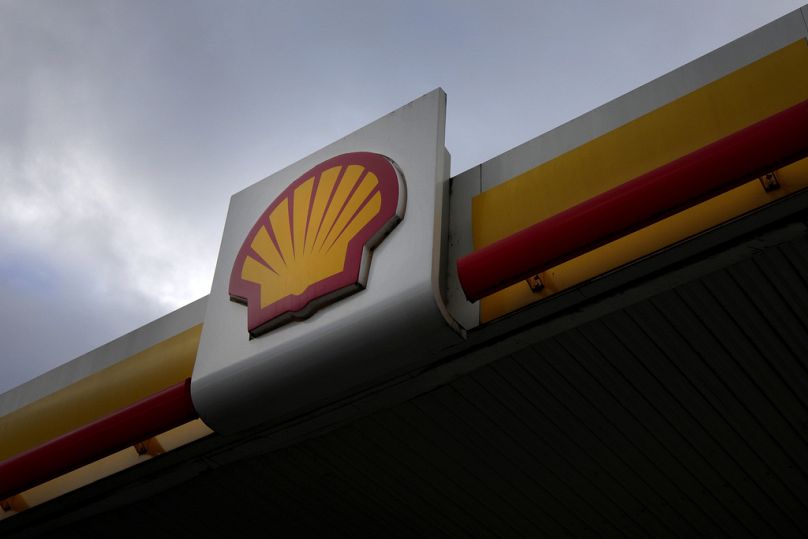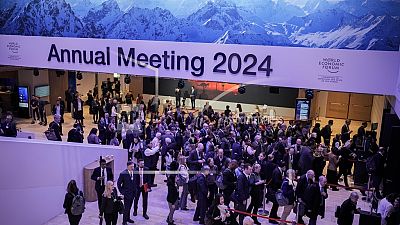Experts say it doesn't pay enough to lead on sustainability, and it doesn't cost enough to lag behind.
Climate and environmental risks are the biggest threats facing the world over the next decade, according to the World Economic Forum.
But business leaders see ‘tipping points’ like rising global temperatures as a longer-term worry than government leaders, a survey released by the forum ahead of its annual meeting in Davos found. It's one of the major barriers to rapid action on sustainability.
“If you look at the world's 2,000 most influential companies, they have a combined revenue of about $45 trillion [€41.3 trillion], which is 42 per cent of global GDP,” Gerbrand Haverkamp, executive director of the World Benchmarking Alliance (WBA), tells Euronews Green.
“They probably have about 1 billion people working in their supply chain. So we're talking about companies with an enormous influence. They have emissions that exceed those of countries.”
Haverkamp says we need to make sure they are using this influence to help achieve global goals. The reality is that most are failing to live up to that responsibility.
‘It's not only oil and gas’
WBA measures the progress the world’s top 2,000 companies are making on the UN Sustainable Development Goals (SDGs).
So far it has looked at the areas where the biggest transformations need to take place for SDGs to be achieved: from food and finance to social concerns, nature and climate. Next is urban systems - a rapidly emerging market in developing nations driven largely by real estate and construction companies.
Just 12 per cent of the UN’s SDGs are currently on track. It means that in terms of poverty, gender inequality, climate change and biodiversity loss, we’re massively behind.
When it comes to climate progress, the oil and gas industry is perhaps an obvious place to start, Haverkamp explains, with companies like ExxonMobil, Shell, Chevron and BP not doing what is needed to keep global warming below 1.5C.
“But it's not only oil and gas,” he says. Around a third of global greenhouse gas emissions come from food systems but companies in this sector are not pursuing net zero or taking care of nature.
“It is a very complicated industry because it relies on millions and millions of farmers. I mean, to go through that transition and bring all of these farmers along, it's going to be incredibly difficult.”
The companies leading the charge towards sustainability, according to Haverkamp, are those like Danish clean energy firm Ørsted which are showing how you can make progress while still being profitable. The automotive industry has also made major strides with a real acceleration in the positive trends towards sustainability.
How can companies be encouraged to lead on climate?
There are some major barriers to encouraging companies to be more ambitious.
“What we see right now is that it doesn't pay enough to lead, and it doesn't cost enough to lag behind,” Haverkamp explains.
The World Benchmarking Alliance aims to provide data about how companies are performing on the SDGs to the world. They believe this improves transparency for the public but also for investors and regulators who can make sure that it pays to be ahead and costs to be behind.
But it could soon pay to be more aware of climate impacts. More and more business leaders are recognising the need for change in order to make it through the next decade. That doesn’t necessarily mean they are taking action, however.
A survey of more than 4,700 CEOs released at Davos on Monday by one of the world’s largest consulting firms, PwC, found that a growing number didn’t think their company would survive the next 10 years due to pressures like climate change.
A third anticipated needing to shift the way they generate value in the next three years because of climate risks. While four in 10 CEOs said they would accept lower returns for climate-friendly investments, less than a quarter reported that climate-related issues had led to changes in business models over the last five years.
It reveals that many businesses don’t yet properly understand climate-related risks or include them in their future planning.
Overall, Haverkamp says, to rebuild trust the world’s most influential companies need to be accountable.
“We can only trust those that we feel are accountable to society and the expectations that we place upon them,” he explains. This means companies need to acknowledge these sustainability expectations, respond to them, be transparent and “walk the talk”.
“That is why these benchmarks are important because we think at the end of the day, it’s going to help us rebuild trust in the world’s most influential companies.”
Watch the video above to see the full interview with the World Benchmarking Alliance.




